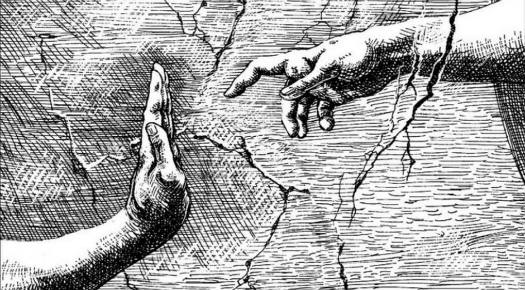
According to an article in The National Post, there has been an alleged humbling of the atheists as of late. Others disagree.
The opinion piece spoke about the event in the O2 arena of London. Here, Sam Harris, world-famous New Atheist and neuroscientist, and Jordan B. Peterson, clinical psychologist and professor at the University of Toronto, sat and had a discussion.
The article stated, “There is a pop cultural title belt on the line, and for the first time in years, the atheist will be the clear underdog. Peterson is a psychologist whose popular appeal is partly based on his repurposing of religious myth for modern life.”
Peterson claims a complicated relationship with the Christian faith in terms of self-identification, where he does not believe in the Abrahamic God but acts as though such a God exists. The argument proposed in the report is that the publications of the New Atheists – Hitchens, Dennett, Dawkins, and Harris – should indicate a declining interest in the questions of religion and faith.
However, the latter 2010s represent a re-emergence of interest in faith-based topics from within the framework of the faith-based topics.
The article accused, “The New Atheists — the hyper-rationalist anti-religious movement of which Harris was once a star — are not new anymore. Quite the opposite. The enlightened, progressive, secular left wing has turned on them as they struggled with their own scandals of intolerance, Islamophobia, sexism, and sophist sloganeering.”
Going on to quote the philosopher of biology Michael Ruse, who opined the movement was akin to a balloon that once “pricked, it went nowhere,” the article reflected on the timeline of observation for Ruse, where the dynamic of atheism into the New Atheism comes with a history.
In particular, a history with the “crisis point in 1982” with Ruse’s attendance in Arkansas as an expert witness for the American Civil Liberties Union (ACLU). The purpose was to challenge the teaching of so-called “creation science” or, more properly, Young Earth Creationism and Old Earth Creationism – in the majority of cases.
Ruse attended alongside the prominent evolutionary biologist Stephen Jay Gould. Gould considered science and religion compatible insofar as they consist of “Non-Overlapping Magisteria” or independent domains of inquiry or universes of discourse.
That is when one speaks of religious themes and moral narratives, they not contradict the empirical evidence and theoretical groundings of science, for example with Evolutionary Theory, because these are areas that do not mutually contradict one another.
The article covering the case later stated, “It was like the Scopes Monkey Trial all over again. Ruse compared this experience to ‘going over the top at the Somme,’ and said it gives him ‘street credentials” in the atheism ‘world. More recently, he has found himself using that cred to criticize those who take atheism too far, especially Dawkins, whom he compared to Donald Trump as someone who argues by ‘trivializing the stuff into slogans.’”
Ruse, apparently, sees a shift in the cultural zeitgeist happening since the tragedy of 9/11. The time when the then US President George W. Bush proposed a religious framing for a clash of civilizations. There were fears around then prime minister of Canada Stephen Harper harboring a Christian agenda and that anti-evolution was being proposed in American schools, all at the same time.
“In those times, there was a countercultural boldness in standing up for atheism. People were especially keen for a coherent opposition to Islamic extremism that was fair and humanistic, distinct from the Islamophobic Christian right wing that was keen to rouse a new crusade,” the article asserted.
Then some of the New Atheist leading lights began to rise and the push back against religious fundamentalism, and pseudoscience became important as a public criticism. With the developments into the present, the article claims that the trend has been a humbling of the New Atheists, where the social meaning or force of New Atheism declines in its “urgency.”
The report continued to note that the prominence of creationism at one time has waned and alongside this decline in urgency of a reaction came the decrease in the prominence of New Atheism. It quoted Ruse once more stating the two sides have been cooling, where it “takes two to tango.”
“Sociologically, the expectation was that religion would decline and atheism increase as science literacy increased, and as older people who were raised with religion at home are replaced by younger people who were not,” the article explained, “But that is not what has happened. On the contrary, supernatural belief in things like miracles and angels seems to actually decline with age, according to recent surveys. Among Canadians who tick “none” for their religion on sociological surveys, which have risen from 10% in 1985 to about 25% today, about two fifths say they believe in God all the same.”
This then leads to commentary by the University of Waterloo sociologist Sarah Wilkins-Laflamme. She commented on the context with the non-religious not being atheists by necessity and the unaffiliated having more than the average amount of religious sensibilities with “individually constructed belief systems and personal spiritual practices.”
That points to the main assertion of The National Post that the individuals involved in the work atheism as a modern movement work within a context of religion and science being seen as more often compatible compared to the prior decade or two.
The article asserts and concludes, “This is why religion has survived not only the progress of science, but also the attacks of atheists. Their arrows miss their mark, and as the dangers of religious extremism fall down the list of cultural preoccupations, so too does movement atheism.”
Photo Credits: The Inquisitr
